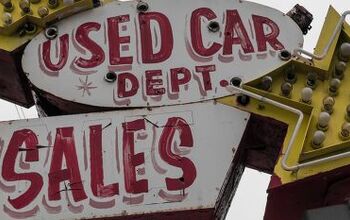AutoNation: What Do You Mean "Our" Inventory Problem, Kemosabe?
Rumors of GM channel-stuffing became reality when we heard that the General was forcing dealers to take on unwanted inventory to qualify for incentive cash. And while the smaller dealers are stuck between a rock and a hard place, big boys like AutoNation at least have enough clout to make a choice. And CNN reports that AutoNation has told GM where it can stick its overstock. GM and Chrysler “have implemented wholesale incentive programs where they basically say to get the incentives for the inventory you want, you have to buy more inventory,” AutoNation CEO Mike Jackson said Thursday with his trademark subtlety. “The channel is full, and they are trying to stuff more in. I think this is the wrong thing to do. We are not playing that game.” Meanwhile, GM and Chrysler are exhorting their dealers to take more unwanted inventory. While on a sales drum-up dealership tour last week, Chrysler Vice Chairman Jim Press said the automaker needs dealers to begin ordering vehicles because the “downside could be a lot worse” if orders don’t increase. For the OEMs, anyway. AutoNation’s fourth quarter sales dropped 34 percent, although $200 million in cuts and $750 million in debt paydown last year have helped keep the retailer afloat. “We do believe that there’s the possibility of an improvement in March if credit really begins to thaw, but we are taking a wait-and-see attitude,” Jackson said. “We want to see it before we’ll stop at that level.”
More by Edward Niedermeyer


































Comments
Join the conversation
psarhjinian : "A decent compromise would be to report on sales by collected accounts receivable instead of orders taken or invoices." Agreed. My earlier point was simply that channel stuffing is a practice which does nothing but cause troubles in the long run - sure you're "hitting the number" by cramming inventory down your channels throat - but its likely artificial and unrelated to end-customer demand, and IT WILL eventually catch-up to you. It's an awful position the dealers get put in, getting their arms put behind their backs monthly to take more shit which isn't selling. A tougher revenue recognition practice is the answer, and your suggestion is perfectly reasonable, although I would suggest revenue recognition at sell-thru to the consumer is the answer to this problem entirely. The dealer & manufacturer then become aligned to the same goal - selling cars to people who buy them. I am just surprised that a mature industry such as the autos have not addressed this already.
I feel that since new cars, unlike game machines or running shoes, sell at relatively low volumes, through well-controlled distribution networks (branded dealerships) and have ample paperwork attached to them (registration, financing, etc.), there is no practical excuse for not using the moment of final customer delivery as the time to book the sale. Anything earlier only invites the problems we're discussing here. I suppose the one legitimate complication is the fact that some dealerships might finance their inventory/floorplan through a third party bank. At that point, once the dealer gets custody of the cars, the mfg'r has been paid and (assuming fairly normal contract provisions) the risk of sale is on the dealer and his bank. Even if the cars never sell, the mfg'r keeps the cash and the problem belongs to the dealer and his bank. The mfg'r already has his money, so why should he not recognize that? Of course, floorplan financing done through a subsidiary of the mfg'r leaves a good deal of the risk still in-house. Well, there is nothing stopping the accounting standards people from demanding that two numbers be reported: The number of new cars shipped for which the manufacturer has been paid in cash (not financed internally) in the reporting period, and the number of new cars actually taken and registered by customers in the reporting period. Reporting both these numbers would actually be very revealing, because it would expose the level of channel stuffing going on at any given point. I'm sure a certain amount is good; dealers build up inventory during traditionally slow months and sell it down during busy selling months, and mfg'rs can run their factories at a steady rate. But excess channel stuffing could be easily detected with such numbers.
The other side of the coin is that since they're built, they have to move somewhere. The longer that is, the less likely it will be sold. Would you buy a vehicle that's been sitting around almost a year between factory lots, airport runways and dealer lots? Why? With that in mind, how does that affect the 2010's which are scheduled to be built in 5 months or less time. Is there enough time to reduce inventories? Interesting times.